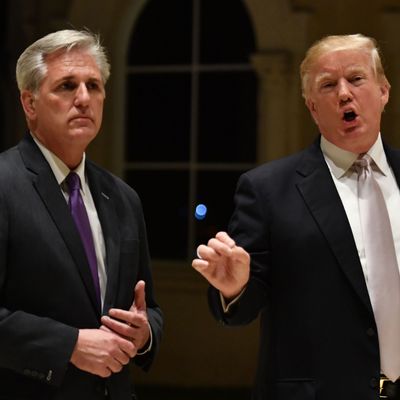
Trump’s shenanigans have made a new piece of budget jargon suddenly relevant. The word of the day is rescission.
In budget-talk, a “rescission” (the noun form of the verb “rescind”) is the cancellation of previously appropriated spending. Under current budget procedures, either the president or Congress can initiate consideration of a package of proposed rescissions; if they aren’t approved by a majority in both Houses and signed by the president in a short period of time, they expire. Once a robust part of budgetary politics (Reagan was particularly fond of them), rescissions have largely fallen out of use more recently, in part because they were temporarily replaced by a presidential line-item veto (which was declared unconstitutional by the Supreme Court in 1998), and in part because regular appropriations have been increasingly replaced by big spending deals that the White House and congressional leaders bless.
Neither George W. Bush nor Barack Obama used their rescission authority, though Obama did make the gesture of asking for “enhanced” rescission powers that would require congressional votes.
Back when rescission requests were common, they were sometimes motivated by changing economic circumstances or revenue forecasts; sometimes by unused appropriations that were no longer deemed necessary; and sometimes just as a publicity device aimed at a president or a Congress controlled by the opposite party.
None of these circumstances explain the latest rescission talk emanating from the White House and from House Majority Leader Kevin McCarthy. They just can’t take the heat over decisions they made literally the week before last:
Congress is considering letting President Donald Trump roll back some of the just-passed $1.3 trillion federal spending package, as Republicans in the House and Senate home on spring recess are getting hammered politically by conservatives for having approved the big spending bill.
To some extent, this may simply represent a continuation of Trump’s extended kvetching before signing the omnibus bill in the first place. Someone may have explained to him that the line-item veto he said he wanted upon signing the omnibus wasn’t constitutional. A rescission package is the only similar tool available, and unlike the omnibus, a resolution of approval for rescissions can’t be filibustered by Democrats. Beyond that rationale, it’s unclear what exactly is going on, as Politico notes:
White House officials are working closely with House Majority Leader Kevin McCarthy (R-Calif.) on the rescission package, said the sources. It’s not clear which programs could be targeted or when the House would vote, although the White House had targeted dozens of programs in Trump’s 2019 budget proposal.
You know, that Trump 2019 budget proposal that no one took seriously.
Getting rescission approval through the Senate with its paper-thin Republican majority — including the GOP senators who worked on the omnibus for a long time — could be a reach, to put it mildly. Aside from the possibility that it would divide and embarrass Republicans while uniting and enthusing Democrats, the maneuver doesn’t exactly have the best optics, as one Democratic staffer sardonically observed:
“The omnibus was a responsible agreement enacted into law with bipartisan votes and the president’s signature,” said Matthew Dennis, spokesman for House Appropriations Committee Democrats. “Calling for a do-over because you didn’t like the press coverage after the fact is the height of absurdity.”
To put it another way, a “do-over” represents a budget process that well reflects the erratic dynamics of the Trump era.






























